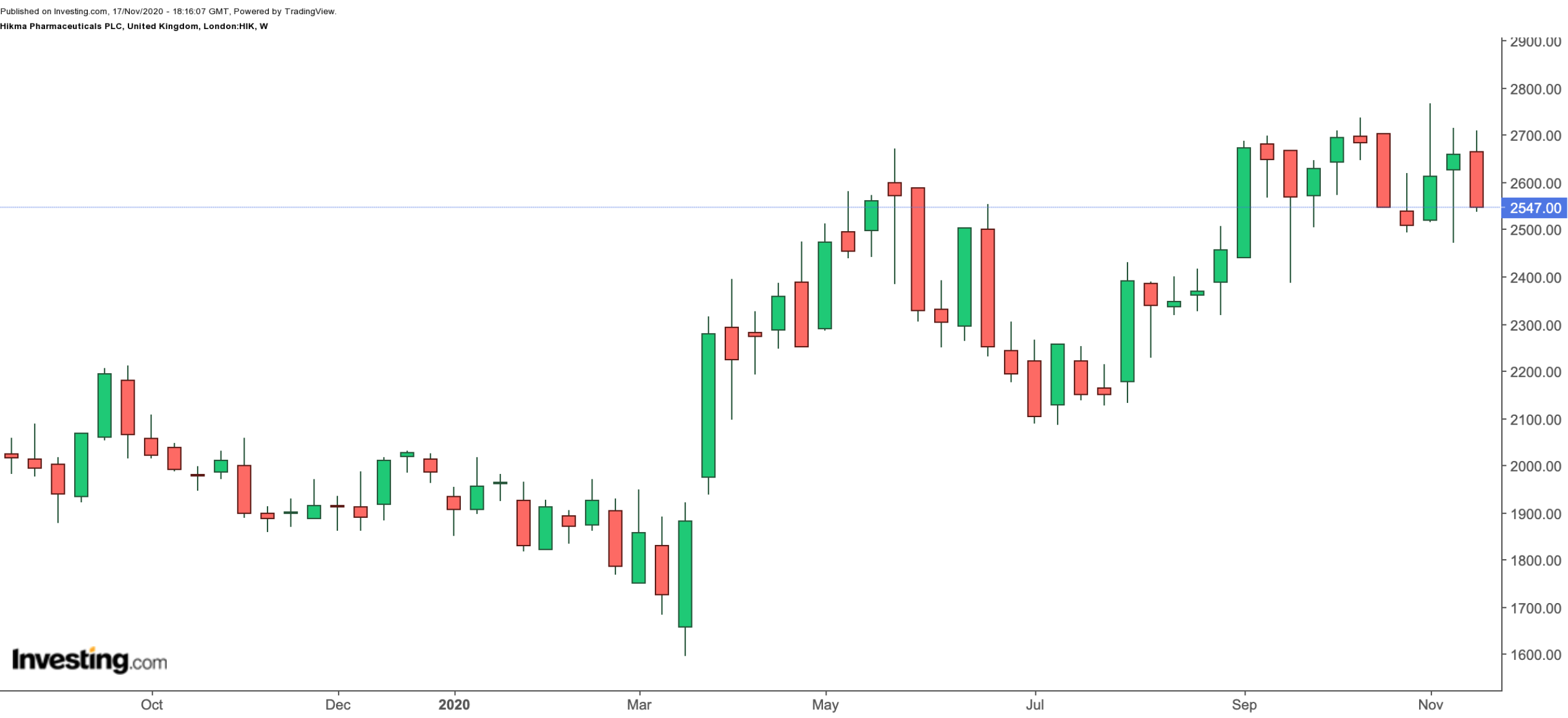Recent positive news about a COVID-19 vaccine has put the limelight on health-care and pharmaceutical companies, especially BioNTtech (NASDAQ:BNTX), Moderna (NASDAQ:MRNA) and Pfizer (NYSE:PFE).
Today, we extend the discussion to the generic drugs market and a UK-based firm, Hikma Pharmaceuticals (LON:HIK), (OTC:HKMPY), which has recently started manufacturing Remdesivir—Gilead Sciences' (NASDAQ:GILD) antiviral drug—under contract in Portugal. In October, the U.S. Food and Drug Administration (FDA) approved Remdesivir for coronavirus treatment of hospitalized patients.
Generic Market Is Growing
The FDA describes a generic drug this way:
"A medication created to be the same as an existing approved brand-name drug in dosage form, safety, strength, route of administration, quality and performance characteristics.”
Manufacturers can start producing generics when the exclusive patents on drugs expire. Research led by Olivier J. Wouters of the London School of Economics and Political Science cites:
"Generics can, in theory, be sold for a fraction of the price of brand name drugs."
According to IMARC, the "Global Generic Drugs Market (will) Reach US$497 billion by 2025." In 2019 it was $367 billion.
Metrics from IBISWorld also show that in the U.S., "The market size, measured by revenue, of the Generic Pharmaceutical Manufacturing industry is $49.3 billion in 2020." In fact, more than 90% of all U.S. prescriptions filled in 2019 were generic drugs. In the UK, the number reached 75% in 2017, compared with the Organisation for Economic Co-operation and Development (OECD) average of 52%.
In addition to the current figures, changing demographics will likely help generic businesses grow their top lines. The global population is aging.
The United Nations states says:
"In 2020, there are an estimated 727 million persons aged 65 years or over worldwide. This number is projected to more than double by 2050, reaching over 1.5 billion persons. The share of older persons in the global population is expected to increase from 9.3 per cent in 2020 to 16 per cent in 2050."
As a result, we can expect more chronic illnesses in the coming decades, translating into more generic drug production. The generic pharmaceutical market is an important one not only for health professionals, drug manufacturers and policy-makers, but for investors.
With that said, here is a closer look at HIK stock.
Hikma Pharmaceuticals
London-headquartered FTSE 100 member Hikma Pharmaceuticals is a multinational generics manufacturer. The company was founded in 1978. Since then, it has grown both organically and through acquisitions worldwide.

Its portfolio is sold in both hospitals and retail markets. Analysts cite the breadth of its portfolio, the robustness of its manufacturing capabilities, and the reliability of its distribution channels.
In August, management released half-year trading results. Revenue came in at $1,132 million, up 8% year-on-year (YoY). Cash flow of $292 million meant an increase of 52% YoY. Earnings per shares (EPS) were 87.6 cents, up 15%.
Three segments contributed to revenues:
- Injectables: saw double-digit revenue growth;
- Generics: maintained core operating margin
- Branded: achieved 6% growth in core operating profit.
Even before gaining the non-exclusive supply deal with Gilead, Hikma manufactured a wide range of injectable therapeutics for patients on ventilators in the U.S.
On Nov. 5, the group provided a positive trading update with improved full-year guidance. CEO Siggi Olafsson highlighted the company's ability to "supply the medicines most needed by ... customers, including those used in the treatment of COVID-19."
So far in the year, the shares are up around 32%. On Nov. 17, HIK closed at 2,547p ($69.5 for U.S.-based shares). With a market capitalization of 5.87 billion, the company could still grow significantly. Its forward P/E and P/S ratios stand at 18.98 and 3.71, respectively. We'd look to buy the dips in the stock. Long-term shareholders would also be entitled to a dividend yield of around 1.4%.
Finally, those investors interested in Hikma shares who do not want to commit capital to a single company may want to research two ETFs that include HIK stock as a holding: iShares Core MSCI EAFE ETF (NYSE:IEFA) and the iShares MSCI EAFE ETF (NYSE:EFA).
Bottom Line
In addition to the bio-pharma companies investors have been watching in 2020, other U.S.-listed generics manufacturers that may be appropriate for long-term portfolios include Bridgewater, New Jersey-headquartered Amneal Pharmaceuticals (NYSE:AMRX), India-based Dr Reddys Laboratories (NYSE:RDY), Irish-headquartered Endo International (NASDAQ:ENDP) and Perrigo (NYSE:PRGO), German-based Fresenius Medical Care (NYSE:FMS), Philadelphia-based Lannett Company (NYSE:LCI) and Israeli-headquartered Taro Pharmaceutical Industries (NYSE:TARO) and Teva Pharma Industries (NYSE:TEVA).
Considering that nine out of every 10 U.S. prescriptions filled are generic, Hikma, as well as the companies mentioned above, deserve further due diligence.
